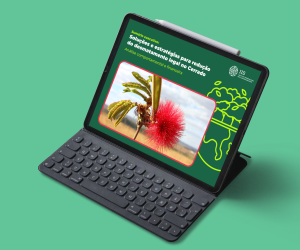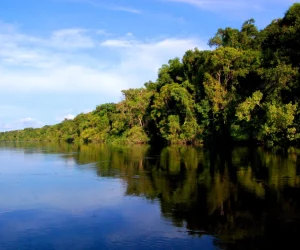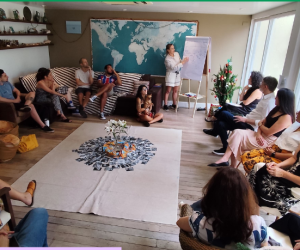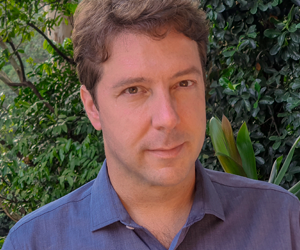02.04.25
IIS Seminar in Brasília Discussed the Main Challenges for Reducing Deforestation in the Cerrado
In 2023, more than 60% of all legal deforestation in the country occurred in the Cerrado. Actions aimed at reducing these numbers face an additional challenge in this biome: the region is also the largest agricultural producer in Brazil. Therefore, policies focused on the conservation of native vegetation need to consider not only environmental and climate benefits but also the access of Brazilian producers to deforestation-free commodity markets.
To understand and discuss this scenario, the IIS held the seminar “Solutions and Strategies for Reducing Legal Deforestation in the Cerrado” in Brasília. The event brought together decision-makers, public policy makers, members of the commodity production chain, researchers, and representatives from the third sector.
André Lima, Secretary of Deforestation Control and Territorial Environmental Management at the Ministry of Environment and Climate Change, discussed the public strategies that have been implemented to mitigate the challenges faced in the region:
“A major challenge, especially for the Cerrado, is the conservation of the so-called assets of native vegetation, which is what can be legally deforested, meaning how to discourage legal deforestation or how to encourage the conservation of those areas that can be legally deforested. And the event addressed this topic with data, research, and debates in a very rich way,” he commented.
Fernanda Gomes, project coordinator, presented the study “Factors Influencing the Decision-Making of Rural Producers Regarding Land Use,” which analyzed the challenges of engaging producers in deforestation-reduction policies.
“It was important to bring the perspective of the key actors for the conservation of the Cerrado, which are the rural producers, the landowners. But I think the most important aspect was the richness of the debate with researchers. We brought science, also the private sector, the public sector, so this multiplicity of dialogue was the most positive point,” she praised.
Experts and representatives from institutions such as the World Wide Fund for Nature (WWF), Conservation Strategy Fund (CSF), ERA, the Amazon Environmental Research Institute (IPAM), the Task Force Combating Deforestation of the Brazilian Coalition on Climate, Forests, and Agriculture also participated in the seminar.
“It is very important to see IIS collaborators addressing topics such as sustainable land management, which aligns with our strategic lines of action. Fernanda Gomes’ research presented a solid analysis and robust results based on scientific methodology. It was great to see this work shared with experts, producers, and the target audience, generating conversations and debates and increasing knowledge about the Cerrado and its challenges. I’m sure this project will continue, bringing even more research, development, and innovation on such a key topic for Brazil and the world,” added Agnieszka Latawiec, President and Co-Founder of IIS.
The event was part of the project “Incentives and Interventions for Behavior-Based Policies for a Deforestation-Free Soy Supply Chain in the Cerrado,” executed by IIS in partnership with the Center for Conservation and Sustainability Science at PUC-Rio (CSRio) and funded by the Land Innovation Fund (LIF). The event was supported by WWF-Brazil.








